In the News
APF Canada's media responses to the latest issues and events in Asia presented in chronological order
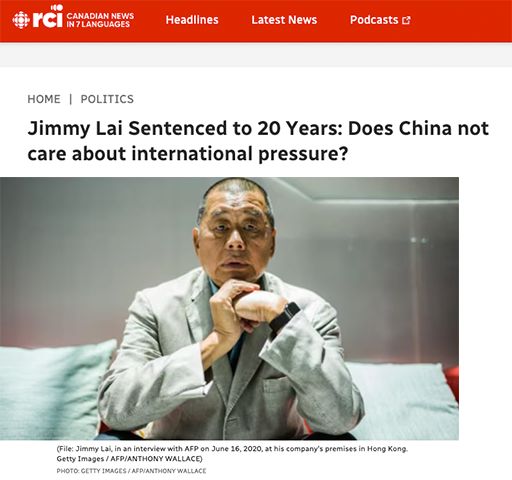
RCI via Getty Images / AFP/ANTHONY WALLACE
Jimmy Lai Sentenced to 20 Years: Does China not care about international pressure?
Radio Canada International, February 13, 2026
Featuring: Vina Nadjibulla, Vice-President Research & Strategy, APF Canada
Excerpt: On Monday (February 9), a Hong Kong court sentenced Jimmy Lai, founder of Apple Daily, to 20 years in prison for conspiracy to collude with foreign forces and endangering national security, which is the longest sentence since the implementation of the Hong Kong National Security Law.
Vina Nadjibulla, Vice-President, Research & Strategy at the Asia Pacific Foundation of Canada, . . . [expressed] deep disappointment with the verdict.
"Jimmy Lai’s sentence underscores the extent to which Hong Kong’s judicial system has been fully subsumed into Beijing’s broader political and security framework," said Nadjibulla.
She believes that under the current circumstances, sustained public pressure on China is unlikely, on its own, to produce results. Beijing has shown that it is willing to absorb reputational costs, particularly when it frames these cases as matters of national security. However, this does not mean the outside world has no leverage. Calls for Mr. Lai’s release on humanitarian grounds remain the most credible and potentially effective avenue.
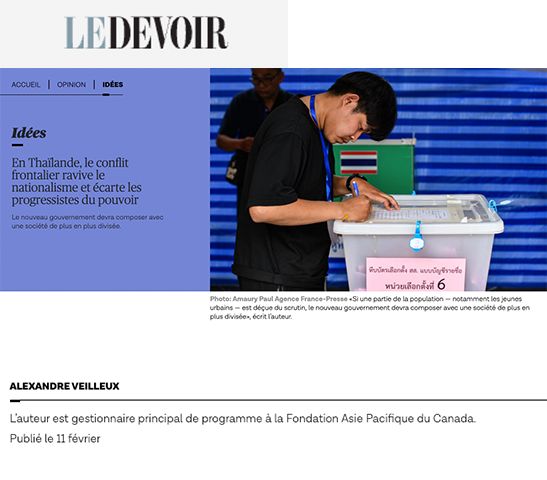
Le Devoir via Amaury Paul, Agence France-Presse
En Thaïlande, le conflit frontalier ravive le nationalisme et écarte les progressistes du pouvoir
Le Devoir, 11 fevrier 2026
Mettant en vedette : Alexandre Veilleux, L’auteur est gestionnaire principal de programme à la Fondation Asie Pacifique du Canada.
Extrait : Les électeurs thaïlandais étaient appelés, dimanche, à faire deux choix déterminants : élire le parti chargé de former le prochain gouvernement et décider de l’ouverture d’un processus de révision constitutionnelle. Après plusieurs sondages favorables au parti progressiste, le Parti du peuple, beaucoup prévoyaient un élan démocratique.
Mais la « vague progressiste » annoncée ne s’est pas matérialisée. Le parti conservateur pro‑royaliste Bhumjaithai, qui a axé sa campagne sur le patriotisme et la défense du territoire face au regain de tensions frontalières avec le Cambodge, est finalement sorti vainqueur. Cette victoire confirme la capacité des partis conservateurs à mobiliser l’électorat en période d’incertitude, en s’appuyant sur un discours nationaliste axé sur la sécurité.
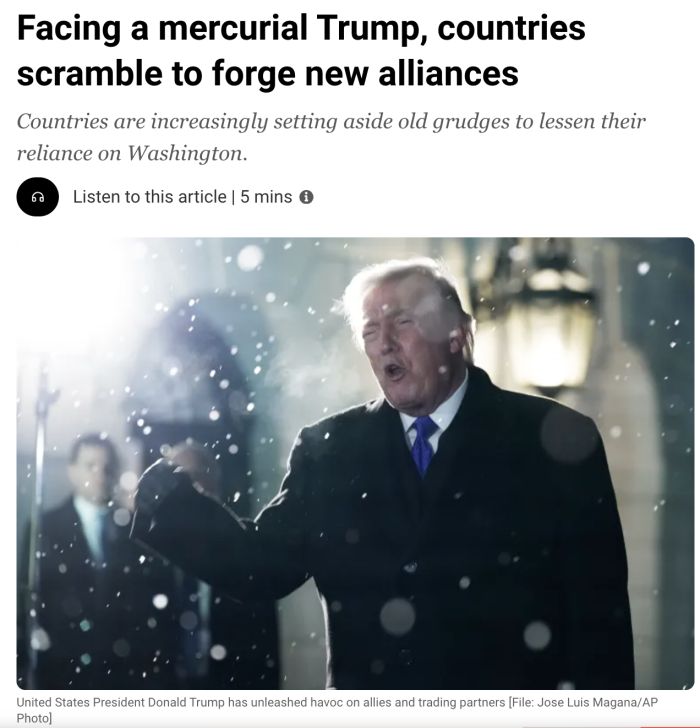
Al Jazeera
Facing a mercurial Trump, countries scramble to forge new alliances
Al Jazeera, February 10, 2026
Featuring Vina Nadjibulla, Vice-President, Research & Strategy, APF Canada
Excerpt: “Countries are trying to diversify economic and security partnerships,” said Vina Nadjibulla.
“Many US allies, especially in the Indo-Pacific region, won’t decouple from the US – the US is too important, especially for security – but they are all looking for a US-plus strategy to minimise risks."
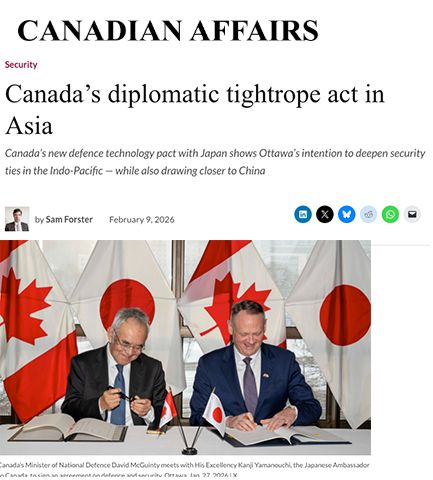
Canadian Affairs via X
Canada’s diplomatic tightrope act in Asia
Canadian Affairs, February 9, 2026
Featuring: Vina Nadjibulla, Vice-President Research & Strategy, APF Canada
Excerpt: "The expanding network reflects Ottawa’s effort to ensure its Indo-Pacific pivot is not defined solely by China — or even by its closest Northeast Asian allies — but by a wider web of security and economic relationships.
From Nadjibulla’s perspective, walking that diplomatic tightrope is demanding but doable.
“As long as … the government’s narrative is clear, nuanced and sophisticated, and clearly outlines what it is that we’re trying to do with China and what will remain off limits, I think that would be understood in the region.
“ But for that, we do need to communicate as clearly as possible, and to engage in a lot of diplomacy with these other partners.”
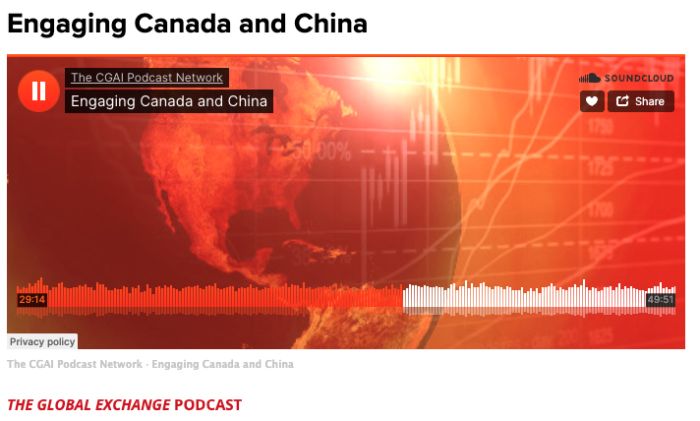
Canadian Global Affairs Institue
Engaging Canada and China
Canadian Global Affairs Institue - The Global Exchange Podcast, February 3, 2026
Featuring Vina Nadjibulla, Vice-President, Research & Strategy, APF Canada
Excerpt: On the Canada-China trade deal struck last month on PM Carney's trip to Beijing, Nadjibulla says that the deal resituates Canada's approach to China but that "there are a lot of conversations that need to happen here with Canadians.... about all the profound shifts to [Canada's] foreign policy and engagements."
She emphasized that while the joint statement is from both Canada and China, the provisional document on the agreement is strictly from the Canadian side and acts as "Canada's government expectations and understandings of that agreement."
Nadjibulla also emphasizes that Canada's Indo-Pacific Strategy needs to be revised at the moment Canada is experiencing "because you can't just have a regional approach to engaging the world, we need an overall situation of Canadian foreign policy... and a national security strategy."
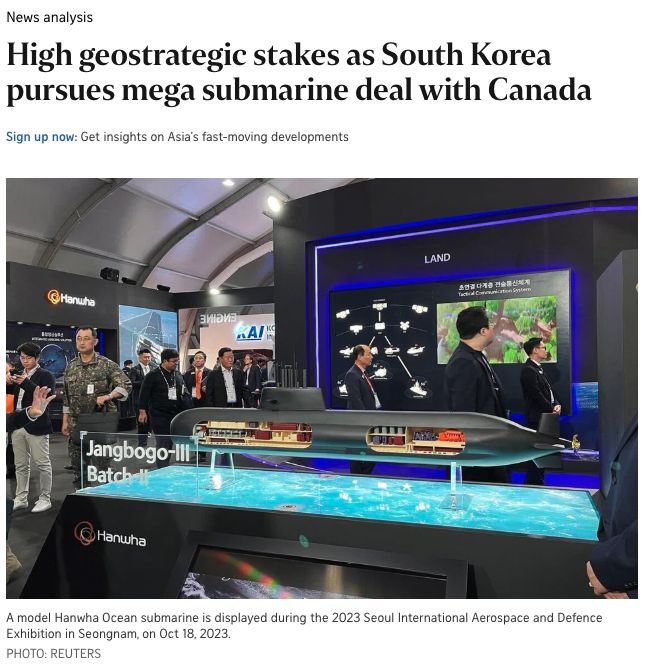
The Strait Times
High geostrategic stakes as South Korea pursues mega submarine deal with Canada
The Strait Times, February 3, 2026
Featuring Vina Nadjibulla, Vice-President, Research & Strategy, APF Canada
Excerpt: According to Nadjibulla, the South Korea-Canada Security and Defence Cooperation Partnership underscores “how closely Ottawa is linking this [submarine] procurement to broader defence-industrial cooperation”.
At a time when there is domestic pressure to protect domestic manufacturing, “Canada is explicitly signalling that CPSP is not only about meeting military requirements."
“It is also about industrial strategy – creating high-paying jobs, building sovereign sustainment capacity, and using a generational programme to strengthen Canada’s marine defence industrial base over the fleet’s operational life."
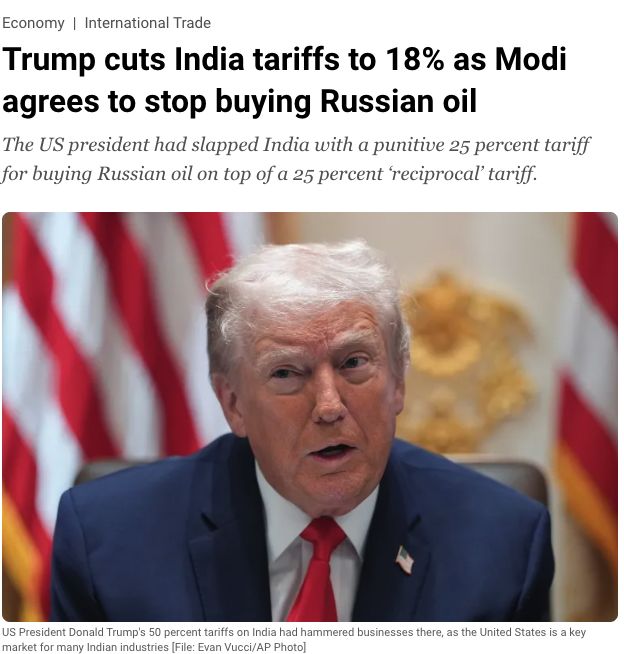
Al Jazeera
Trump cuts India tariffs to 18% as Modi agrees to stop buying Russian oil
Al Jazeera, February 2, 2026
Featuring Vina Nadjibulla, Vice-President, Research & Strategy, APF Canada
Excerpt: “Prime Minister Modi welcomed the news [of reduced US tariffs on imports from India] but didn’t reassert President Trump’s claim that India was lowering tariffs on U.S. goods,” pointed out Vina Nadjibulla.
“It looks like for now a deal around tariffs and de-escalation of tariffs…. It’s still an important breakthrough.”
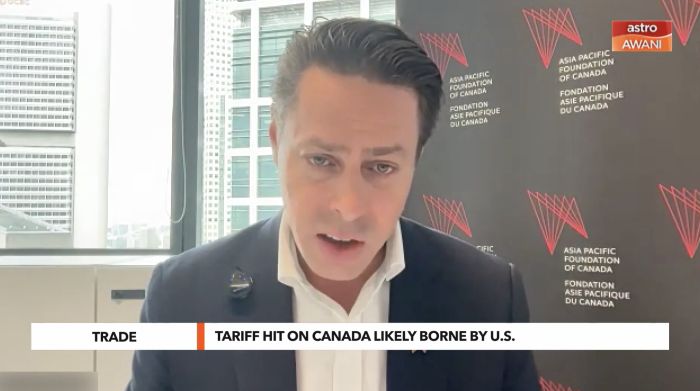
AWANI International
Trump tariff threat to Canada mere 'bluster', expert says
AWANI International, February 2, 2026
Featuring Barrett Bingley, Asia Regional Director, APF Canada
Excerpt: Bingley responds to questions regarding the integrity of United States–Mexico–Canada Agreement (CUSMA) by noting that tariff threats following Prime Minister Carney's Davos speech are simply more political posturing by the Trump Administration. "Under CUSMA... in the non-market FTA clause... any signatory has a remedy" to terminate the agreement if one partner signs a trade deal with a non-market economy, namely China.
Despite the threat of tariffs, Bingley argues that the "U.S. buyer... would be the one primarily paying the tariffs" on challenging to 'replace' Canadian products in the U.S. market, such as heavy oil and aluminum, not Canadians.

Saturday Morning Sit‑Down
Saturday Mornings: Variable Geometry & a New Global Order: What Carney’s Davos Message Means for Asia
Saturday Morning Sit‑Down (podcast), February 1, 2026
Featuring Barrett Bingley, Asia Regional Director, APF Canada
Excerpt: Bingley says Prime Minister Carney's speech in Davos "struck the moment" for Canadians and a global audience because "people had been waiting for someone to crystallize what everyone had been feeling."
However, this 'variable geometry' strategy is easier said than done, as most middle powers, Bingley says, "prefer the global governance mechanisms that are unfortunately breaking down... It's a lot more work, but what's the other path? If your other choice is either bandwagoning or being picked off by a great power... then you're probably going to put the work in."
Bingley adds that while the emphasis on the speech was on the U.S., it's important to consider that other great powers at play. "At a minimum this speech was about the U.S. and China... [and] Russia should probably be included in this."
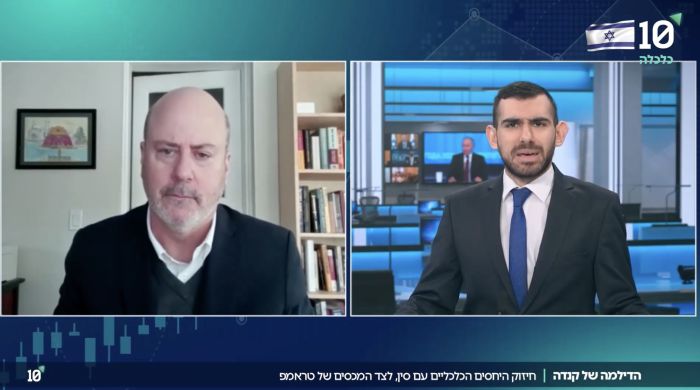
Channel10 - Israel’s Economic Channel
Canada-Asia Engagement and Global Strategic Shifts
Channel10 - Israel’s Economic Channel, February 1, 2026
Featuring Jeff Nankivell, President & CEO, APF Canada
Excerpt: Nankivell says "there is a deeper [global] strategic shift on the part of Canada" made apparent in PM Carney's widely recognized speech from the World Economic Forum in Davos last month.
"The opening to China, and really the re-establishment of a more normal bilateral dialogue after a period of a seven-year freeze, is part of that "variable geometry" strategy to "take the world as it is, not as we wish it to be."
"[Carney] is signalling that Canada is going to pursue partnership with countries even where we have deep disagreements on some issues around values because of the circumstances that we are in, so it's not just about what's happening with China."
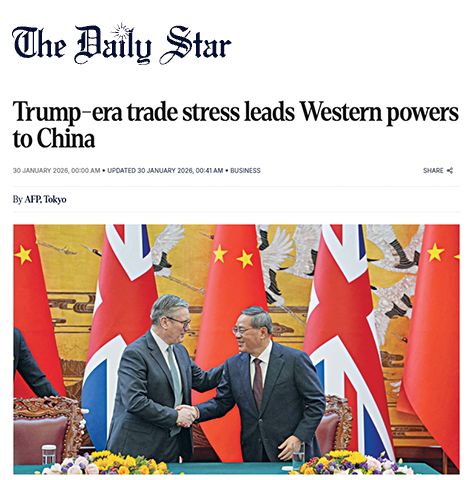
The Daily Star via AFP
Trump-era trade stress leads Western powers to China
The Daily Star, January 30, 2026
Featuring Vina Nadjibulla, Vice-President Research & Strategy, APF Canada
Excerpt: Carney’s visit “signalled a fundamentally new approach to how Ottawa intends to navigate a more fragmented, contested and uncertain world," wrote Vina Nadjibulla, Vice-President Research & Strategy at the Asia Pacific Foundation of Canada.
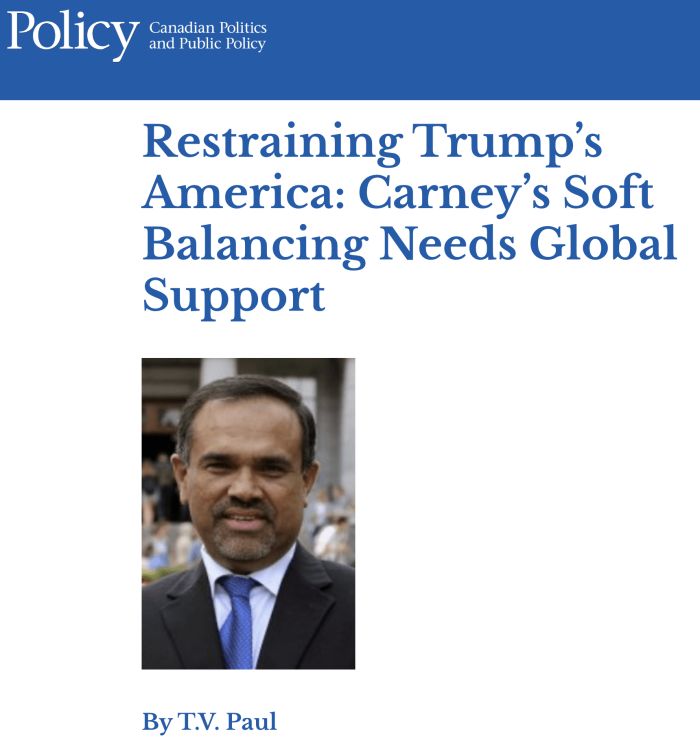
Policy Magazine
Restraining Trump’s America: Carney’s Soft Balancing Needs Global Support
Policy Magazine, January 28, 2026
Featuring T.V. Paul, Distinguished Fellow, APF Canada
Excerpt: "Prime Minister Mark Carney’s call in Davos for joint activism by middle powers to resist U.S. President Donald Trump’s aggressive neo-imperial policies deserves global support, especially from the states most affected by them.
... The intent of the call is to raise the reputational and normative costs of aggressive policies, thereby affecting the administration’s cost–benefit calculations and influencing American public opinion."
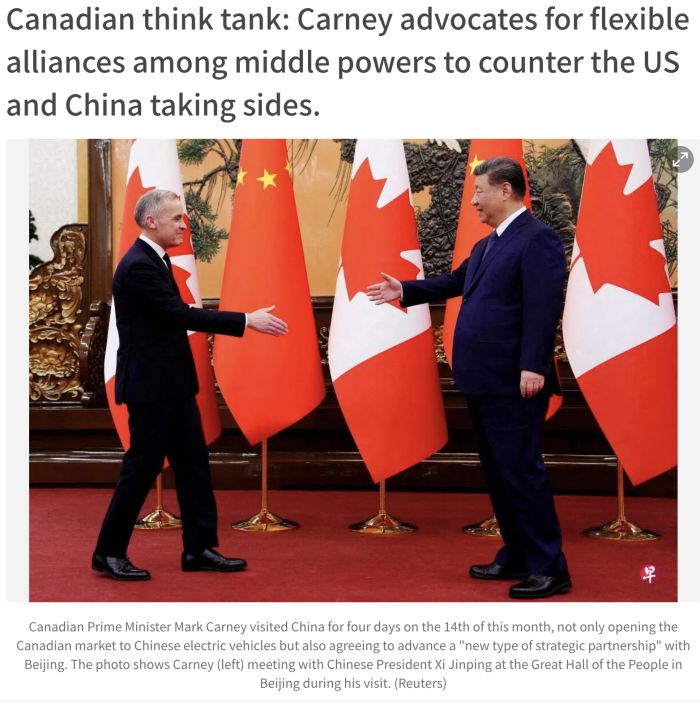
Lianhe Zaobao News
Canadian think tank: Carney advocates for flexible alliances among middle powers to counter the US and China taking sides.
Lianhe Zaobao News (Singapore), January 26, 2026
Featuring Barrett Bingley, Asia Regional Director, APF Canada
Excerpt: Bingley highlights the "variable geometry" strategy posited by PM Mark Carney in Davos last week, and its potential impact on Asian nations.
"Carney is proposing a different development path for middle powers. This path is not simply about counterbalancing or following the power, and it has become less clear which power to side with now... Carney's point is that middle powers can form alliances as needed, formulate new rules, try to organize some countries, and then see how large these alliances can grow."
Despite Trump's continued pressure, Bingley points out that the Greenland incident this month shows that the U.S. still recognizes the value of its allies, limiting the maximum pressure it can exert. "Deep down, the US is certainly thinking about how much pressure they can put on Canada without shocking Europe, South Korea, and Japan and being seen as a highly unreliable ally."
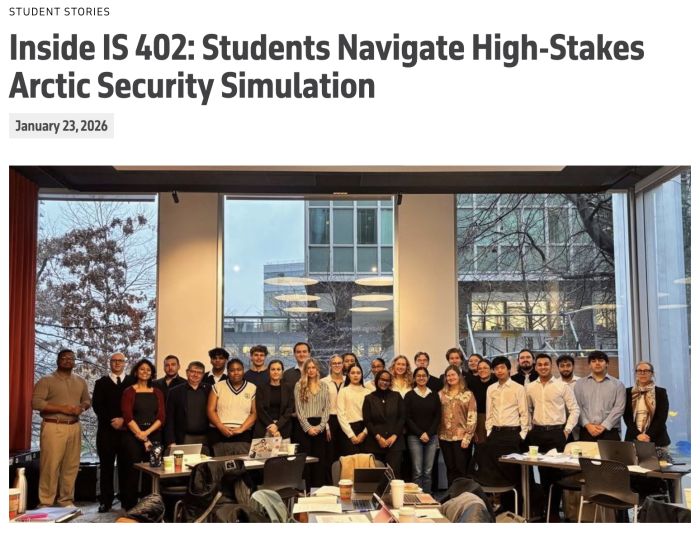
SFU
Inside IS 402: Students Navigate High-Stakes Arctic Security Simulation
SFU, January 23, 2026
Featuring Erin Williams, Director of Programs, APF Canada, and Hema Nadarajah, Program Manager, Southeast Asia, APF Canada
Excerpt: Students in this year’s IS 402 Global Security Governance seminar received a unique opportunity as faculty partnered with APF Canada to explore global governance, regime complexity, and security studies, with a particular focus on the North Pacific and the High North.
“The students approached hybrid threats with rigour, creativity, and a strong sense of responsibility—exactly the kind of talent Canada needs in an evolving security landscape,” said Dr. Nadarajah.
Williams praised the university’s next generation of thinkers. "They were given a series of scenario-based challenges to practice consultation, critical thinking, and crisis communication, and to consider how those skills apply in real-world contexts. Each time, they rose to the occasion and performed exceptionally well,” she said.
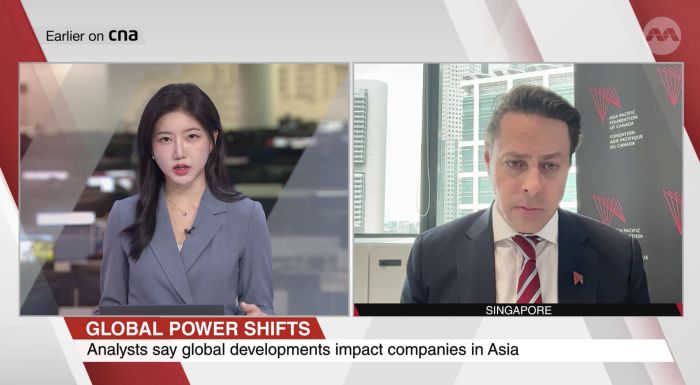
CNA
Asian Countries Face Evolving Geopolitical Landscape
CNA, January 21, 2026
Featuring Barrett Bingley, Asia Regional Director, APF Canada
Excerpt: "Canada is pursuing opportunities on the trade side" of the Asia Pacific, said Bingley, speaking from APF Canada’s regional office in Singapore. "Canada is going for as many bilateral and plurilateral deals as it can."
He highlighted ongoing negotiations with ASEAN and Thailand, as well as the ratification of the new Canada-Indonesia Comprehensive Economic Partnership Agreement (CI CEPA).
Bingley said that, in terms of defence security, "there are going to be areas where middle powers align with each other, and [may] even align with great powers" as there is a "tremendous amount of industrial strategy to be done inside defence and security" in the region, both at the "ministerial level, and the company level. Companies need to be aligning themselves with these opportunities and how their governments are recreating and making sure their geopolitical opportunity and risk teams are on top of these changes."
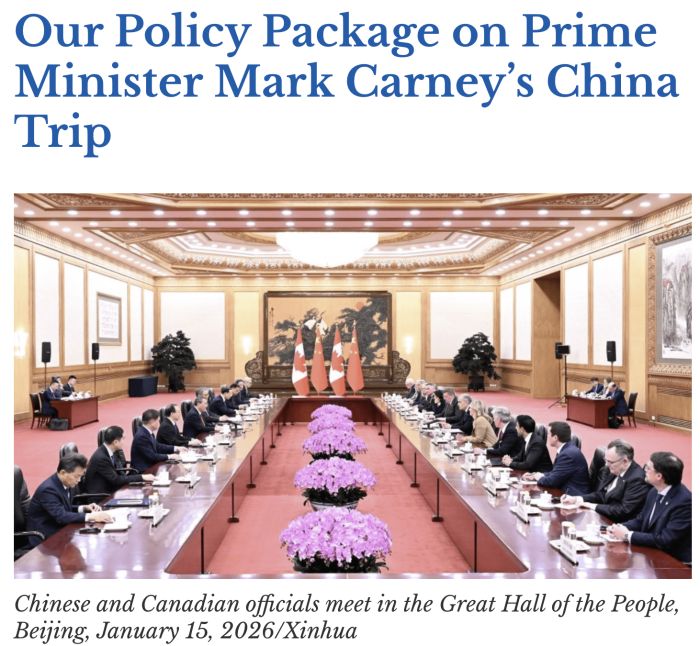
Policy Magazine
Policy Magazine's Policy Package on Prime Minister Mark Carney’s China Trip
Policy Magazine, January 21, 2026
Featuring Vina Nadjibulla, Vice-President, Research & Strategy, APF Canada
Excerpt: Contributing writer Vina Nadjibulla, penned a policy piece on the big-picture implications of Carney’s China trip, including his bilateral meeting with Chinese President Xi Jinping.
“While others continue to delay or hope for a return to a more familiar order,” writes Nadjibulla, “Canada is testing whether a pragmatic, interest-driven approach can provide a workable foundation for an independent Canadian foreign policy.”
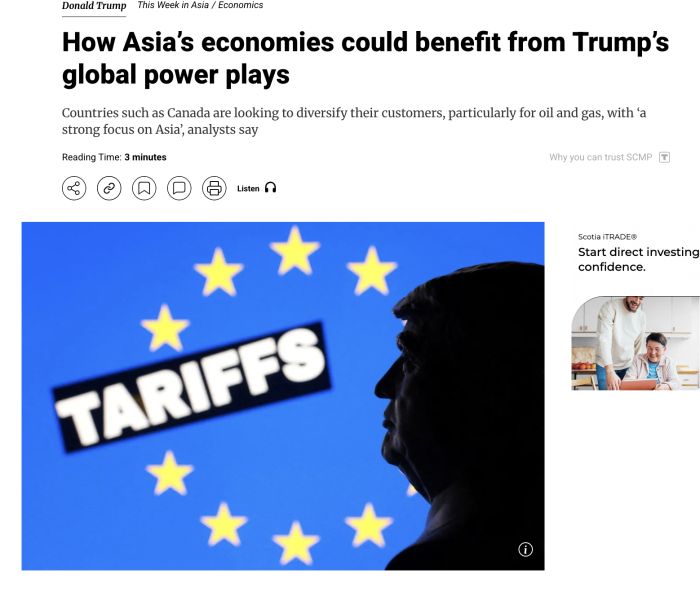
SCMP
How Asia’s economies could benefit from Trump’s global power plays
SCMP, January 21, 2026
Featuring Barrett Bingley, Asia Regional Director, Singapore Office, APF Canada
Excerpt: “In terms of natural resources and goods trade in general, I think Prime Minister [Mark] Carney has been eminently clear that Canada will seek to diversify its customers, with a strong focus on Asia,” Bingley told This Week in Asia.
“[That’s] not because of a threat of U.S. control over them, but because no one wants a suddenly unreliable customer taking 75 per cent of your product. That’s just not good risk management.”
When it comes to oil supply chains, Bingley said that “recent kinetic engagements between Iran, Israel, and the United States have done little” to increase U.S. sway over energy supplies to import-dependent Asia. “It’s unclear whether current U.S. pressure on the Iranian regime will change this dynamic in any way, or whether it is increasing U.S. leverage at all. Washington might think it has increased leverage, but the market seems to be indicating that it does not believe this,” he added, as crude oil prices remain relatively steady despite international pressure.
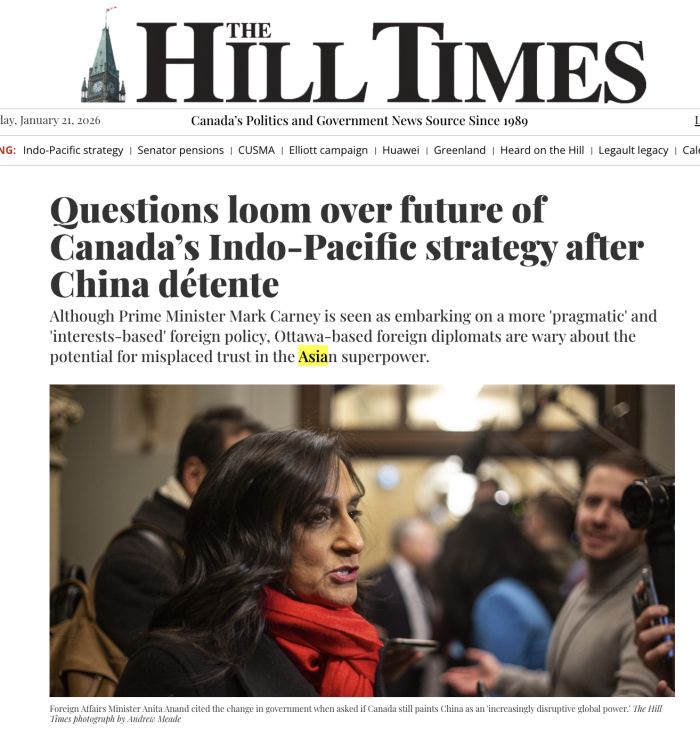
The Hill Times
Questions loom over future of Canada’s Indo-Pacific strategy after China détente
The Hill Times, January 21, 2026
Featuring Vina Nadjibulla, Vice-President, Research & Strategy, APF Canada
Excerpt: Nadjibulla says Carney’s trip to China on January 16 didn’t just reframe Ottawa’s relationship with Beijing, it also signalled a new approach to foreign policy.
“It is a signal of Canada attempting to pursue a more independent foreign policy from the U.S. One that is more fit-for-purpose for today’s world, which is very different from the world of 2022 when the Indo-Pacific Strategy in Canada’s overall foreign policy was being articulated."
“The prime minister is articulating a more pragmatic, interests-based foreign policy that is not as focused on alliances and reliance on the U.S. and traditional mechanisms, such as NORAD, NATO, the United Nations, and [the World Trade Organization], but rather what he calls plurilateral interest-based coalitions that come together on some issues.”
“It’s not that the threat from China has reduced; it’s that the threat landscape has expanded and Canada now has to deal with a lot more than the threat from China,” she added.
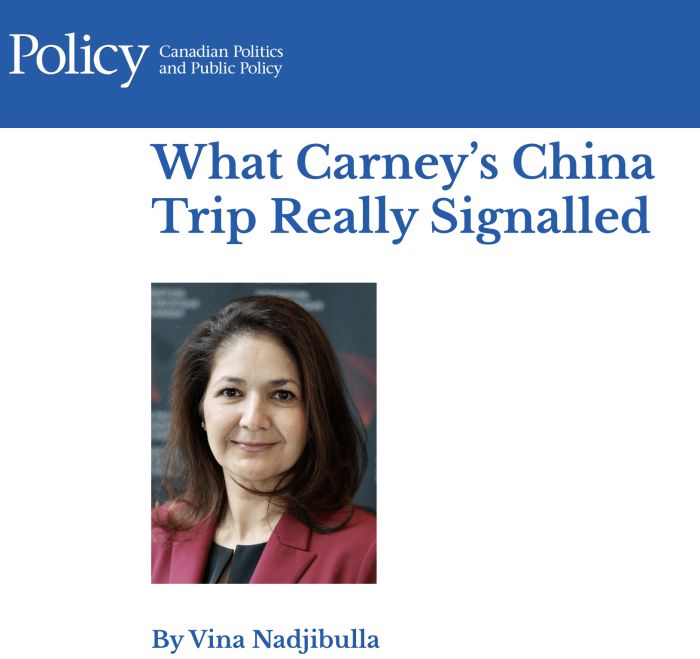
Policy Magazine
What Carney’s China Trip Really Signalled
Policy Magazine , January 17, 2026
Guest Contributor: Vina Nadjibulla, Vice-President, Research & Strategy, APF Canada
Excerpt: "Prime Minister Mark Carney’s visit to China will stand as one of the most consequential moments in Canada’s foreign policy. It not only reframed Canada’s relationship with China but also signalled a fundamentally new approach to how Ottawa intends to navigate a more fragmented, contested and uncertain world.
On the bilateral front, the trip produced three tangible outcomes: a new strategic partnership framework, a roadmap for economic and trade cooperation, and provisional progress on two of the most politically sensitive trade files in the relationship—electric vehicles and canola."
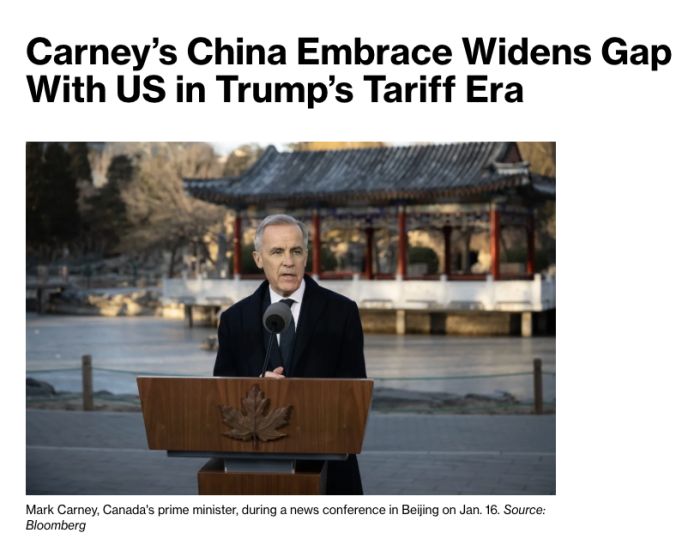
Bloomberg
Carney’s China Embrace Widens Gap With US in Trump’s Tariff Era
Bloomberg, January 18, 2026
Featuring Jeff Nankivell, President & CEO, APF Canada
Excerpt: Carney’s step is a banker’s hedge — a “backing off,” said Jeff Nankivell, who was formerly posted in China as a senior Canadian diplomat.
“It’s fair to assume that the task for the Canadian negotiators was to see what’s the minimum concession we can make on the EV tariff that would be enough to get the Chinese side to agree to significant reductions on their tariffs,” he said. “This is that deal.”
“The first job of a national leader, and especially in times of economic duress, is to keep the country’s options open."
